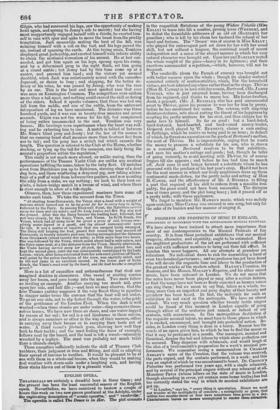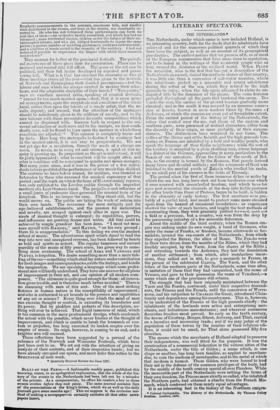r PROGRESS AND PROSPECTS OF MUSIC IN ENGLAND,
CONSIDERED IN CONNEXION WITH THE APPROACHING MUSICAL FESTIVALS.
WE have always been inclined to attach more importance than most of our contemporaries to the Musical Festivals of this country. It is from these periodical exhibitions that our musical progress, character, and capability, ought to be estimated. Here the mightiest productions of the art are performed with sufficient care and with sufficient numbers to bring out their full effect. In London this never happens. All our attempts at grandeur are ridiculous. No individual dares to risk the assembling a band of even two hundred performers ; and no professor has yet been found who will devote the requisite time and labour to the production of the greatest works of the modern school. HA.YDN'S Creation, his Seasons, and his Masses, MozAaT's Requiem, and his other sacred music, have been unheard in London. We do not mean that the notes have never been played or sung after a certain fashion, or that the songs have not been as finely executed as human voices can sing them ; but we mean to say that, taken as a whole, no- thing more than an imperfect and puny display of their beauty and grandeur has been heard. In fact, the materials for such an exhibition do not exist in the metropolis. We have no choral school. We very much question whether twenty treble singers could be found at this moment in London capable of going through either of the oratorios just named, or indeed of any oratorio, with correctness. In this metropolitan destitution of the requisite musical talent, we must turn to those places in which it is excited, encouraged, and brought into periodical action. Be- -sides, in London every thing is done in a hurry. BISHOP has the words of an opera given him, to which he has to find the music so that it may be performed in a month. Our managers, musical and theatrical, despise the toil and labour by which alone perfection can be secured. They dispense with rehearsals, and would laugh at the idea of a twelvemonth's preparation for a week's musical per- formance. We remember seeing a memorandum in CHARLES ASHLEY'S score of the Creation, that the volume was received, the parts copied, and the oratorio performed, in a week: and this was an exploit of which he was accustomed to boast. Dr. CROTCH'S Palestine was performed two years ago, with a single rehearsal, and by several of the principal singers without any rehearsal at all. Monsieur FETIS (whose letters on the state of music in London, though abounding in error, yet contain some home truths)has but too correctly stated the way in which its musical exhibitions are got up.
"In London," says he, "every thing is speculation. Hence we must not wonder at the multiplicity of concerts ; a multiplicity so great, that within two months three or four have sometimes- been given in a day.
Charlatanism leaves no means unemployed to render them attractive. Emphatic announcements in the journals, enormous bills, and smaller ones distributed in the rooms, and even in the streets, are constantly re- sorted to. He who has not witnessed these performances can form no just idea of them ;—an orchestra hastily assembled, and which has had no rehearsal ; some celebrated singers, sinking under the fatigue of their un- interrupted labours, and who are obliged continually to repeat the same pieces ; a greater number of middling performers, vocal and instrumental ; and a selection of music suited to the capacity of the auditory. I had not believed it possible to experience the disgust with which these concerts inspired me."
They manage tar better at the provincial festivals. The periodi- cal recurrence of these gives time for preparation. Plans can be matured and carried into full effect. The gems of the art can be polished, and their full lustre developed by repeated and perse- vering toil. What is it that has.elevated the character of two of these meetings above all the rest—what has given to the festivals of Norwich and Birmingham their decided preeminence—but the labour and care which are always exerted 'in making their selec- tions, and the admirable discipline of their bands ? "Two points," says an excellent musical critic, speaking of musical festivals,, " cannot be too much insisted upon,—first, that it is upon gene- ral arrangements, upon the magnitude and excellence of the whole ,band, rather than upon the talents of a single artist, that the re- sults depend ; and second, that the attention of the managers should be solicitously given to the addition of novelty, and to the nice balance with those prescriptive favourite compositions which cannot be dispensed with. Success both in respect to the uni- versal satisfaction of audiences and to the receipts, we dare confi- dently aver, will be found to turn upon the manner in which these essentials are adjusted."* This opinion is completely borne out by facts. How long the metropolis is destined to continue last in the musical career, it is not easy to prognosticate. We are not yet ripe for a revolution, though the seeds of a change are sown. In music, as in every art and science, a spirit of free in- quiry is growing up. In proportion as the art is understood, it will be justly appreciated : what is excellent will be sought after, and what is worthless will be consigned to quacks and music-mongers. Not many years since, and it was in the power of a few indivi- duals to have prohibited the performance of any music they disliked. The oratorio we have before named, for instance, was branded as heterodox by those who assumed the musical supremacy of that period ; and the work on which the fame of HAYDN mainly reposes, was only exhibited to the London public through the imperfect medium of a Lent Oratorio band. The prejudices and influence of a small junto of professors then governed the musical taste of the kingdom. This is no longer the case. They stand still, but the world moves on. The public are taking the work of reform into their own hands. The reverence for mere antiquity and for age-hallowed establishments, and the passion for melioration• and novelty, are arrayed against each other in open war. The circle of musical thought is enlarged; its capabilities, powers, and influences are growing deeper and wider. All that could be achieved by simple grandeur has been done. "I must not mea- sure myself with HANDEL," said HAYDN, "on his own ground ; there he is unapproachable." To this feeling we owe the modern school of music. The adventurous spirit which dared to lead the way into new and unexplored recesses, has been followed by hearts as bold and spirits as ardent. The regular tameness and correct puerility of the music of fifty years since, has given way to some- thing more awakening. The school of ABEL and VANHALL and PLEYEL is forgotten. We desire something more than a mere tick- ling of the ear—something which shall lay nature under contribution for fresh images and correspondencies,excite the feelings, and kindle the imagination. We are speaking a language which some profes- sional men will hardly understand. They have one answer for all plans of improvement in their art, and one opinion of all modern com- posers. "The old music is quite good enough for them : all innova- tion gives trouble, and is therefore much better avoided." There is no reasoning with men of this sort. One of the most striking features in human nature is the susceptibility of improvement ; and who is authorized to set bounds to the powers and capabilities of any art or science? Every thing over which the mind of man can exercise thought or control, is extending its boundaries and its power. But by plodders and pedants of this description, no- thing will ever be achieved. That frigid tameness of mind, which is too common in the mere professional drudge, which confounds the actual with the possible, which never kindles at the thought of improvement, and which is unable to break the trammels of cus- tom or prejudice, has long exercised its leaden sceptre over the empire of music. Its reign, however, is coming to an end, and a brighter Eera will succeed.
These reflections have been suggested by a perusal of the schemes of the Norwich and Worcester Festivals, which have just been sent to us. We set out with the intention of giving an analysis of their contents, and of their respective bands ; but we have already occupied our space, and must defer this notice to the SPECTATOR of next week.
• Quarterly Musical Review for June 1827.



























 Previous page
Previous page